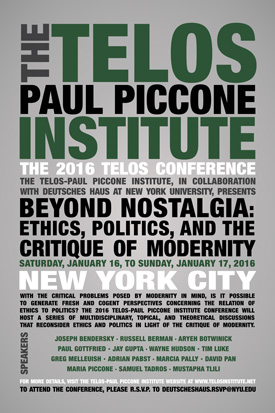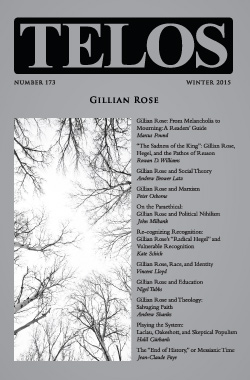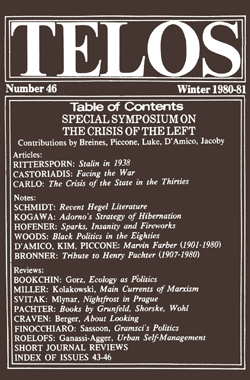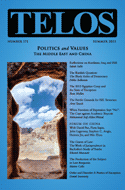By Maja Sidzinska · Thursday, January 28, 2016 The following paper was presented at the 2016 Telos Conference, held on January 16–17, 2016, in New York City. For additional details about the conference, please visit the Telos-Paul Piccone Institute website.
 Introduction Introduction
State institutions, starting with the entity we call “the state” all the way down to city DMV offices, seem no longer capable of acting or behaving ethically, regardless of what type of ethics we prefer to apply to politics—consequentialist, deontological, virtue, or any other—or whether we prefer liberal or communitarian normative agendas. Two features of modern political institutions block their intended functioning, ethical or not, and lead to new ethical crises. Those features are too-large size and incoherence. Thus even when policies[1] are ethical, institutions’ failures to implement or follow them undermine an ethical politics. And when various policies are implemented unevenly, new ethical problems arise. At least a partial antidote to these problems may be found in libertarian municipalism, the social-ecological approach articulated by Murray Bookchin, that demands small scale and direct democracy.
Continue reading →
Telos 173 (Winter 2015) is now available for purchase in our store.
 Gillian Rose (1947–1995) had an influence in excess of her literary output and treatment in secondary literature. Author of eight books, two articles, and four book reviews, she also had important, though perhaps hidden, effects on the UK academic scene through academic friendship, doctoral supervision, and interdisciplinary work. She inspired many students and colleagues, even where she does not appear in bibliographies or citations. She made major contributions to introducing the Frankfurt School to the UK; aided the Hegel renaissance in English-language scholarship; and was an early critic of post-structuralism and political theology. Several of the papers gathered here were first given at a conference at Durham University on January 9, 2015, to mark the twentieth year since Rose’s death. That conference and this special issue of Telos are premised on the view that Rose’s work still has much philosophical insight and inspiration to offer. The authors of these papers were students, colleagues, and/or friends of Rose, or studied her work as part of their doctoral research. The diversity of their fields reflects some of the range and interdisciplinarity of Rose’s own work: Hegel, social theory, Marxism, politics, race, recognition theory, education, and theology. We hope that this issue provokes a renewed interest in what Rose can still offer us today. Gillian Rose (1947–1995) had an influence in excess of her literary output and treatment in secondary literature. Author of eight books, two articles, and four book reviews, she also had important, though perhaps hidden, effects on the UK academic scene through academic friendship, doctoral supervision, and interdisciplinary work. She inspired many students and colleagues, even where she does not appear in bibliographies or citations. She made major contributions to introducing the Frankfurt School to the UK; aided the Hegel renaissance in English-language scholarship; and was an early critic of post-structuralism and political theology. Several of the papers gathered here were first given at a conference at Durham University on January 9, 2015, to mark the twentieth year since Rose’s death. That conference and this special issue of Telos are premised on the view that Rose’s work still has much philosophical insight and inspiration to offer. The authors of these papers were students, colleagues, and/or friends of Rose, or studied her work as part of their doctoral research. The diversity of their fields reflects some of the range and interdisciplinarity of Rose’s own work: Hegel, social theory, Marxism, politics, race, recognition theory, education, and theology. We hope that this issue provokes a renewed interest in what Rose can still offer us today.
Continue reading →
By Vincent Lloyd · Thursday, December 10, 2015 Michel Houellebecq’s novel Submission raises important questions about the cultural crises of modernity. It reflects on the dialectics of post-secularism and post-democracy in ways that have become particularly salient in light of the terror attacks in Paris and San Bernadino. Beginning with Vincent Lloyd’s post today, TELOSscope presents a series of discussions of the novel that will appear over the next several days.
The violence of November 13, 2015, in Paris was met with an avalanche of grief and sympathy from around the world. Similar feelings followed the attack on Charlie Hebdo several months earlier. Paris is an iconic and beloved city; to see blood and bullet holes on the streets of Paris caused pain. Or rather, it causes professions of emotion. In an age of personal mediation, when we are expected to advertise our feelings about world events nearly in real time through tweets and Facebook posts, it is an open question how much feelings are felt—though they are most certainly performed. Affect circulates with ever increasing velocity, but such affect is increasingly shallow, more like a shared way of talking than anything having to do with inwardness. This does not mean mediated emotions are insignificant. As leftist critics of such public mourning charge, shared ways of talking about the world lead to shared ways of seeing the world and can ultimately legitimate violent ways of acting in the world.
Continue reading →
By Sean McMorrow · Tuesday, October 13, 2015  “Facing the War” is a translation from the first section of Devant la guerre, Cornelius Castoriadis’s least regarded work within English-speaking circles. The reason for this marginalization is its central claim that Russian society had transformed into a stratocratic regime, with increased probability for an escalation into a Third World War. Castoriadis’s critics claimed he had missed signs of perestroika and glasnost already on the horizon. Viewed from this perspective, history could not have been more cruel to Castoriadis. However, the value of his work does not depend on a predictive mode of political analysis, a point that is clearly prefaced in this work: calls for predictive accuracy ignore the radical character of historical contingency. In fact, the unexpected events put into motion later by Gorbachev only strengthen Castoriadis’s perspective in the sense that such a development represents the deeper problem of historical indeterminacy, and it is in this respect that his analysis is finely tuned to any society’s condition of historical contingency. “Facing the War” is a translation from the first section of Devant la guerre, Cornelius Castoriadis’s least regarded work within English-speaking circles. The reason for this marginalization is its central claim that Russian society had transformed into a stratocratic regime, with increased probability for an escalation into a Third World War. Castoriadis’s critics claimed he had missed signs of perestroika and glasnost already on the horizon. Viewed from this perspective, history could not have been more cruel to Castoriadis. However, the value of his work does not depend on a predictive mode of political analysis, a point that is clearly prefaced in this work: calls for predictive accuracy ignore the radical character of historical contingency. In fact, the unexpected events put into motion later by Gorbachev only strengthen Castoriadis’s perspective in the sense that such a development represents the deeper problem of historical indeterminacy, and it is in this respect that his analysis is finely tuned to any society’s condition of historical contingency.
Castoriadis’s analysis here is an updated version of the assessment of Russian society that had been developed within Socialisme ou Barbarie. Castoriadis makes a compelling argument that Russia had regenerated itself into a full-blown stratocracy, armed to the teeth and yet still unable to provide its citizens with a functional civic bureaucracy; a decade later he reflects that a core argument of “Facing the War” was that brute force had become the sole signification holding this society together. Castoriadis’s argument operates at two levels: as a political analysis of Russian bureaucratic spheres (the comparison of military capacity between superpowers and a critique of rational determinism within the justification of Cold War strategy—i.e., M.A.D.); and as a political judgement of the imaginary significations that served to orient Russian society. It is through the latter level that lessons on historical contingency are astutely relevant to the contemporary world situation.
Continue reading →
By Marco Patriarca · Thursday, October 8, 2015 It seems that a young internet highflier who calls himself “the Argonaut,” whose idée fixe is the future of the European Union, has become the champion of a possible Federalist European Union and is bombarding the network with a number of miracles that, according to him, are being achieved in Brussels and Strasbourg. He claims that Europe’s political unification is fully realized, that the ECB has extended quantitative easing to all European banks, that the Greek problem, he happily announces, is solved thanks to a giant issue of fifty-year Greek government real estate bonds, which are sending the international financial market agog. The EU Commission, the Argonaut dreams, has decided to support the British suggestion that the EU MPs should work inside various 28 national parliaments, thus integrating the European institutions, and not in Strasbourg; he moreover says that the Frontex Immigrant Agency in Warsaw, duly instructed by Germany, has accepted enthusiastically to coordinate the Mediterranean immigrants distribution among the EU member states who heartedly agree. His most fantastic declaration is that five EU defense ministers of Germany, France, Italy, Spain, and Great Britain, based on articles 28, 42, and 43 of the Lisbon Treaty, have created the EEF, an European Expeditionary Force, which will be based in Sardinia and near Cracow. Special arrangements, he candidly assures the social network, have already been signed with NATO.
Continue reading →
By Pekka Sulkunen · Monday, June 29, 2015  The Kurdish Question is a continuation of violence, protest, and repression that persist from the unfinished national state-building of the early twentieth-century Europe. This article compares it with similar but more successful ones in the Nordic countries. The Kurdish Question depends on the democratization of Turkish society. There are black holes on both sides of the conflict that absorb efforts to build democratic institutions. Enlightenment critique of absolutism in Europe established the supremacy of the social over the political order. The republic represents the will of the people. Koselleck argued that this idea potentially drifts towards totalitarianism and brutalities: those who do not obey are excluded to the point of losing their human worth. This is the heart of the Kurdish Question in Turkey today. In democracy different groups defend their interests in political movements that attempt to rule by law. In the Kurdish Question negotiable interests have been identified and reforms are on the way. The problem is that symbolic black holes absorb efforts to negotiate into the requirement of unity and consequent inability to deal with difference. On the Turkish side, the unity is imposed by the secular and modern nationalism itself. On the Kurdish side it consists of a silence about differences in the Kurd society, which is still largely tribal but with a large population outside the clan system. The Kurdish Question is a continuation of violence, protest, and repression that persist from the unfinished national state-building of the early twentieth-century Europe. This article compares it with similar but more successful ones in the Nordic countries. The Kurdish Question depends on the democratization of Turkish society. There are black holes on both sides of the conflict that absorb efforts to build democratic institutions. Enlightenment critique of absolutism in Europe established the supremacy of the social over the political order. The republic represents the will of the people. Koselleck argued that this idea potentially drifts towards totalitarianism and brutalities: those who do not obey are excluded to the point of losing their human worth. This is the heart of the Kurdish Question in Turkey today. In democracy different groups defend their interests in political movements that attempt to rule by law. In the Kurdish Question negotiable interests have been identified and reforms are on the way. The problem is that symbolic black holes absorb efforts to negotiate into the requirement of unity and consequent inability to deal with difference. On the Turkish side, the unity is imposed by the secular and modern nationalism itself. On the Kurdish side it consists of a silence about differences in the Kurd society, which is still largely tribal but with a large population outside the clan system.
Continue reading →
|
|
 Introduction
Introduction  Gillian Rose (1947–1995) had an influence in excess of her literary output and treatment in secondary literature. Author of eight books, two articles, and four book reviews, she also had important, though perhaps hidden, effects on the UK academic scene through academic friendship, doctoral supervision, and interdisciplinary work. She inspired many students and colleagues, even where she does not appear in bibliographies or citations. She made major contributions to introducing the Frankfurt School to the UK; aided the Hegel renaissance in English-language scholarship; and was an early critic of post-structuralism and political theology. Several of the papers gathered here were first given at a conference at Durham University on January 9, 2015, to mark the twentieth year since Rose’s death. That conference and this special issue of Telos are premised on the view that Rose’s work still has much philosophical insight and inspiration to offer. The authors of these papers were students, colleagues, and/or friends of Rose, or studied her work as part of their doctoral research. The diversity of their fields reflects some of the range and interdisciplinarity of Rose’s own work: Hegel, social theory, Marxism, politics, race, recognition theory, education, and theology. We hope that this issue provokes a renewed interest in what Rose can still offer us today.
Gillian Rose (1947–1995) had an influence in excess of her literary output and treatment in secondary literature. Author of eight books, two articles, and four book reviews, she also had important, though perhaps hidden, effects on the UK academic scene through academic friendship, doctoral supervision, and interdisciplinary work. She inspired many students and colleagues, even where she does not appear in bibliographies or citations. She made major contributions to introducing the Frankfurt School to the UK; aided the Hegel renaissance in English-language scholarship; and was an early critic of post-structuralism and political theology. Several of the papers gathered here were first given at a conference at Durham University on January 9, 2015, to mark the twentieth year since Rose’s death. That conference and this special issue of Telos are premised on the view that Rose’s work still has much philosophical insight and inspiration to offer. The authors of these papers were students, colleagues, and/or friends of Rose, or studied her work as part of their doctoral research. The diversity of their fields reflects some of the range and interdisciplinarity of Rose’s own work: Hegel, social theory, Marxism, politics, race, recognition theory, education, and theology. We hope that this issue provokes a renewed interest in what Rose can still offer us today.  “Facing the War” is a translation from the first section of Devant la guerre, Cornelius Castoriadis’s least regarded work within English-speaking circles. The reason for this marginalization is its central claim that Russian society had transformed into a stratocratic regime, with increased probability for an escalation into a Third World War. Castoriadis’s critics claimed he had missed signs of perestroika and glasnost already on the horizon. Viewed from this perspective, history could not have been more cruel to Castoriadis. However, the value of his work does not depend on a predictive mode of political analysis, a point that is clearly prefaced in this work: calls for predictive accuracy ignore the radical character of historical contingency. In fact, the unexpected events put into motion later by Gorbachev only strengthen Castoriadis’s perspective in the sense that such a development represents the deeper problem of historical indeterminacy, and it is in this respect that his analysis is finely tuned to any society’s condition of historical contingency.
“Facing the War” is a translation from the first section of Devant la guerre, Cornelius Castoriadis’s least regarded work within English-speaking circles. The reason for this marginalization is its central claim that Russian society had transformed into a stratocratic regime, with increased probability for an escalation into a Third World War. Castoriadis’s critics claimed he had missed signs of perestroika and glasnost already on the horizon. Viewed from this perspective, history could not have been more cruel to Castoriadis. However, the value of his work does not depend on a predictive mode of political analysis, a point that is clearly prefaced in this work: calls for predictive accuracy ignore the radical character of historical contingency. In fact, the unexpected events put into motion later by Gorbachev only strengthen Castoriadis’s perspective in the sense that such a development represents the deeper problem of historical indeterminacy, and it is in this respect that his analysis is finely tuned to any society’s condition of historical contingency.  The Kurdish Question is a continuation of violence, protest, and repression that persist from the unfinished national state-building of the early twentieth-century Europe. This article compares it with similar but more successful ones in the Nordic countries. The Kurdish Question depends on the democratization of Turkish society. There are black holes on both sides of the conflict that absorb efforts to build democratic institutions. Enlightenment critique of absolutism in Europe established the supremacy of the social over the political order. The republic represents the will of the people. Koselleck argued that this idea potentially drifts towards totalitarianism and brutalities: those who do not obey are excluded to the point of losing their human worth. This is the heart of the Kurdish Question in Turkey today. In democracy different groups defend their interests in political movements that attempt to rule by law. In the Kurdish Question negotiable interests have been identified and reforms are on the way. The problem is that symbolic black holes absorb efforts to negotiate into the requirement of unity and consequent inability to deal with difference. On the Turkish side, the unity is imposed by the secular and modern nationalism itself. On the Kurdish side it consists of a silence about differences in the Kurd society, which is still largely tribal but with a large population outside the clan system.
The Kurdish Question is a continuation of violence, protest, and repression that persist from the unfinished national state-building of the early twentieth-century Europe. This article compares it with similar but more successful ones in the Nordic countries. The Kurdish Question depends on the democratization of Turkish society. There are black holes on both sides of the conflict that absorb efforts to build democratic institutions. Enlightenment critique of absolutism in Europe established the supremacy of the social over the political order. The republic represents the will of the people. Koselleck argued that this idea potentially drifts towards totalitarianism and brutalities: those who do not obey are excluded to the point of losing their human worth. This is the heart of the Kurdish Question in Turkey today. In democracy different groups defend their interests in political movements that attempt to rule by law. In the Kurdish Question negotiable interests have been identified and reforms are on the way. The problem is that symbolic black holes absorb efforts to negotiate into the requirement of unity and consequent inability to deal with difference. On the Turkish side, the unity is imposed by the secular and modern nationalism itself. On the Kurdish side it consists of a silence about differences in the Kurd society, which is still largely tribal but with a large population outside the clan system. 

